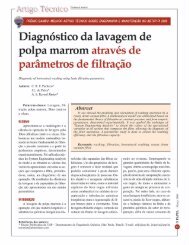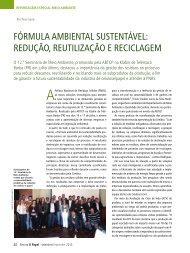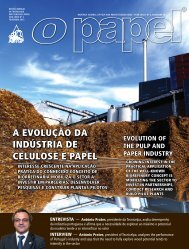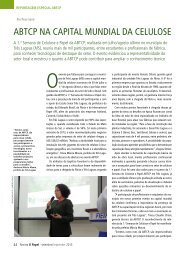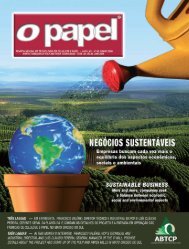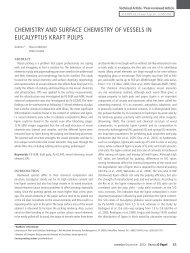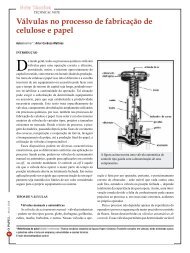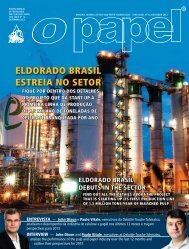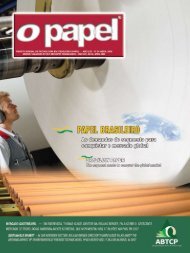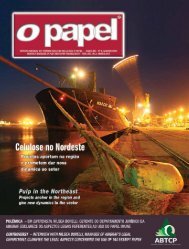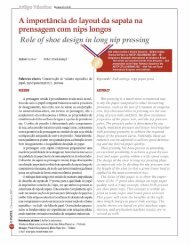international article - Revista O Papel
international article - Revista O Papel
international article - Revista O Papel
Create successful ePaper yourself
Turn your PDF publications into a flip-book with our unique Google optimized e-Paper software.
BRACELPA REPORT<br />
Sector expects leadership from<br />
Brazilian government at the COP-15<br />
By Thaís Mattos<br />
The pulp and paper industry expects<br />
the Brazilian government to be one<br />
of the leaders during negotiations at<br />
the 15th United Nations Framework<br />
Convention on Climate Change, a conference<br />
that will define global climate<br />
policies for the coming years. Over<br />
200 countries will gather in December<br />
in Denmark’s capital, where their representatives<br />
will negotiate proposals<br />
to reduce global greenhouse effect gas<br />
emissions, as well as the countries’<br />
particular contributions, given that<br />
climate change affects the entire world.<br />
Brazil must take on a mature leadership<br />
role during these negotiations,<br />
in line with its growing importance on<br />
the world economic stage. The country<br />
has experience and an enormous potential<br />
in the pulp and paper industry,<br />
as well as in other sectors, including<br />
biofuel, says Carlos Aguiar, president<br />
of Fibria, a company recently formed<br />
by the merger of Votorantim Pulp<br />
and Paper with Aracruz. This opinion<br />
is shared by Fernando Fonseca,<br />
president of Celulose Nipo-Brasileira<br />
(Cenibra) and of the Brazilian Association<br />
of Planted Forests (ABRAF):<br />
“I hope that Brazil stops being a<br />
spectator and takes on the position of<br />
inductor in this process, influencing<br />
the decisions of <strong>international</strong> bodies”,<br />
he says.<br />
It is a difficult task for the Brazilian<br />
government, since the country is seen<br />
by the <strong>international</strong> community as one<br />
of the world’s biggest polluters. This<br />
is due to its condition as a developing<br />
nation in which industrialization<br />
processes and economic activity are<br />
intense, as they are in China and India.<br />
“The COP-15 also offers a rare opportunity<br />
for the country to show the world<br />
that it can continue growing following<br />
a low-carbon emission model”, adds<br />
the general director of Klabin, Reinoldo<br />
Poernbacher.<br />
Thus, it will be essential to show<br />
that what sets Brazil apart from other<br />
emerging nations is its energy matrix -<br />
one of the cleanest in the world, with<br />
more than 40% of it originating from<br />
renewable sources. Forests are another<br />
point it is important to highlight. The<br />
6.7 million hectares of planted forests<br />
of the pulp and paper sector and of<br />
other sectors absorb great volumes of<br />
carbon dioxide from the atmosphere,<br />
thus helping to diminish the effects of<br />
global warming. These differences,<br />
among others, set Brazil apart in the<br />
negotiations.<br />
The glass ceiling is the rate of<br />
Amazon deforestation which, despite<br />
registering a fall in the last few months,<br />
is still very high. “The prevailing image<br />
remains and needs to be changed, it is<br />
the image of a country that emits pollutants,<br />
which ends up making Brazil<br />
one of the villains of global warming”,<br />
states Elizabeth de Carvalhaes, executive<br />
president of the Brazilian Association<br />
of Pulp and Paper (Bracelpa).<br />
There is strong pressure for the Brazilian<br />
government to present concrete<br />
measures to solve the deforestation<br />
problem, and the actual Ministry of<br />
Foreign Affairs has confirmed that it<br />
will present a proposal in Copenhagen,<br />
as long as those countries that produce<br />
more emissions also make a commitment.<br />
“The National Climate Change<br />
Plan has been setting targets, which<br />
is very positive. But Brazil cannot do<br />
this alone, considering that costs are<br />
high and the benefits are for the entire<br />
planet”, says Aguiar. According to him,<br />
it is necessary that other economies<br />
help Brazil and other countries that<br />
have tropical forests in the fight against<br />
global warming. “A quick and efficient<br />
implementation of various instruments<br />
such as the Reduction of Emissions<br />
by Deforestation and Degradation<br />
(REDD) is of great importance, but<br />
continues to be pretty loose and very<br />
controversial”, says Aguiar.<br />
Another issue is that of barriers<br />
which, until now, have prevented the<br />
commerce of forest credits within<br />
the scope of the Clean Development<br />
Mechanism (CDM) for European<br />
Union countries that do not recognize<br />
them as eligible carbon credits created<br />
by forest absorption, whether they be<br />
native or planted.<br />
The justification is that since forests<br />
are susceptible to natural disasters<br />
– such as storms, fires, snow storms,<br />
among others – they cannot be considered<br />
permanent eradicators of<br />
greenhouse effect gases. With this criterion,<br />
the Protocol does not recognize<br />
the benefits of forests for climate, and<br />
consequently, does not favor countries<br />
which invest in this type of clean development<br />
project.<br />
It has been this way until now. However,<br />
the Kyoto protocol, within which<br />
the CDM was created, must be revised<br />
following the COP-15, and if changes to<br />
the mechanism occur, the pulp and paper<br />
sector will have great opportunities. The<br />
president of Fibria is optimistic about<br />
negotiations: “I expect that the CDM’s<br />
O PAPEL - Abril Outubro 2006 2009<br />
21<br />
CADERNO BRACELPA



